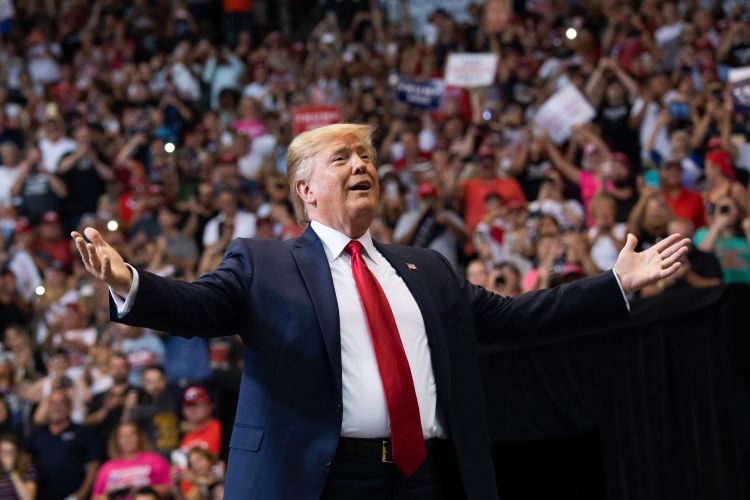
This is a guest post by Emily Holland, an Assistant Professor in the Russia Maritime Studies Institute at the US Naval War College & Hadas Aron, a Faculty Fellow at the Center for European and Mediterranean Studies at NYU.
This week’s violent takeover of the Capitol Building has fueled the ongoing debate on the future of American democracy. For several years analysts have argued that the United States is undergoing the same process of de-democratization as countries like Turkey, Hungary, and Poland. However, the comparison to European populist de-democratization is misleading. The difference between Trump and European counterparts is that the latter do not rely on post-election violence to hold onto power, instead they rig the system long before the election. This week’s events demonstrate what is at stake for American democracy. Unlike in European countries, the elimination of checks and balances is not the main concern. The real danger for the United States is out of control anti-system political violence that brings to a boiling point polarization and racial tensions.
Democratic breakdown or decline in places like Russia, Turkey, Hungary, Israel, and Poland, has inspired theories on how democracies die, comparing the United States to failing democracies around the world. But in these countries, populist insurrection is far more subtle [and effective] than the attempted insurrection on Capitol Hill. Populist leaders have successfully transformed political institutions, concentrated political power, broke down opposition, and dismantled democracy, with little overt violence and often without large-scale election fraud. Trump also attempted these strategies, but mostly failed because of the dispersed power structure of the United States, and his own incompetence.
Winning Elections in a Rigged System
One of the first targets of European populist leaders is the media: either through violent coercion in the Russian case, imprisonment in the Turkish case, or restricted funding in the Hungarian case. As a result, independent media has largely ceased to exist. Populist leaders directly target the opposition, ranging from assassinations to restricting their access to funding and public office. Examples of this strategy include the August 2020 attempted poisoning of Russian opposition figure Alexey Navalny and the murder of prominent Putin-critic Boris Nemtsov in front of the Kremlin in 2015.
Another primary target is the judicial branch, in particular constitutional courts. Both Hungary and Poland are currently under investigation by the European Commission for significantly limiting the role of the courts and illegally changing its composition, and thus violating rule of law principles. Poland’s populist ruling party, for example, enacted legislation in 2020 allowing the government to fire judges based solely on unfavorable rulings. These strategies mean that by election day leaders enjoy very favorable media coverage, a co-opted court system, and weakened opposition. As a result, they do not need to incite mob violence to stay in power.
Trump’s Way: Direct Appeals and Incompetence
President Trump has tried to employ some of these tactics, but has been far less successful. First, while European countries are mostly centralized, in the United States, power is dispersed. The United States has more checks and balances than any other democracy in the world, including two legislative bodies, a strong judicial branch, federalism, and an extremely difficult to alter constitution. In the cases we discuss above, there were few checks and balances to begin with, which made it relatively easy to concentrate power. The United States has the opposite problem: it is very difficult to dispense with even problematic institutions like the Electoral College. Given this challenging institutional landscape, Trump, an anti-establishment leader who cultivates a direct relationship with his base, chose to incite popular violence, leading to a uniquely American populist insurrection.
Another fundamental difference between Trump and his European counterparts is the issue of competence. The most successful populists in Europe are savvy politicians who understand the systems in which they operate. Throughout the COVID-19 pandemic, most populists have at least taken the crisis seriously. Russian president Vladimir Putin funded and distributed an indigenously produced vaccine that may be distributed in the EU. Israeli PM Benjamin Netanyahu is presiding over the fastest vaccination program in the world. Even before the pandemic, many of these leaders provided economic benefits to their constituents through direct social transfers. In Poland, the government passed a family allowance program popular with poor, rural constituents. Throughout his presidency, President Trump did not provide economic benefits to his base. During the pandemic, he personally signed a stimulus check to every American, but facing the ongoing pandemic and subsequent economic devastation he did not involve himself in negotiations over a second stimulus package that could have helped him win support prior to the election.
Mob Violence and Fascism
Neither the past four years of a Trump presidency nor this week’s horrific events have put the United States on a similar path as European populist-ruled states. Trump’s legacy is nonetheless a source of deep concern. Fascist leaders including Mussolini and Hitler employed mob violence to achieve political goals. In 1922, Mussolini organized the Blackshirt March on Rome. Because he was supported by a coalition of the military, business leaders, and the right wing, the King ultimately handed Mussolini power, paving the way to a fascist dictatorship.
Analysts have drawn parallels between Mussolini’s relationship with the conservative coalition in Italy, and Trump and the Republican party. This is an alarming comparison: even after the attack on the Capitol, more than 100 Republican lawmakers voted against the certification of the results of a free and fair presidential election. Unlike in the Italian case, they could not argue that Trump’s intentions are unclear: the president has taken direct action to prevent a transfer of power through the democratic process and cannot be regarded as a well-intentioned democratic leader. Another disturbing aspect of the comparison is the role of law enforcement. In Italy, the military facilitated Mussolini’s power grab. Although there is no direct evidence that law enforcement intentionally enabled the debacle on Capitol Hill, the event highlights the bias of American police forces against non-whites. As many have pointed out, black protesters receive completely different treatment at the hands of law enforcement than do whites.
In 1923, Hitler attempted a coup against the German government – the infamous beer putsch. Though failed, it was one of many incidents of mob violence in interwar Germany that undermined the Weimar Republic and culminated in the Nazi takeover of Germany a decade later. The implication is clear: political violence degrades the rule of law, posing a real risk to democracy. That said, interwar Germany and Italy were young and unstable democracies. The context is crucial: interwar Italy and Germany were fertile ground for a successful populist power grab, the United States is not.
The insidious populist transformation in Russia, Turkey, Hungary, Israel, Poland and others has greatly weakened or destroyed democracy entirely. Trump’s relentless attack on the electoral process shows the strength of American democracy, where free and fair elections still determine the next president. But the events of the past week highlight the deep and devastating polarization of American society, a decline in the sanctity of institutions, and the racism that continues to plague American society. The implications of these events and the legacies of the Trump administration are thus vastly different from those derived from wider de-democratization processes. Instead of focusing on a concentration of power and the destruction of liberal institutions, Americans should be more worried about the consequences of racism, inequality, and political deadlock.
Elizaveta Gaufman is Assistant Professor of Russian Discourse and Politics at the University of Groningen, the Netherlands. She is the author of "Everyday Foreign Policy: Performing and Consuming the Russian Nation after Crimea" (2023) and "The Trump Carnival: Populism, Transgression and the Far Right" (2024).


0 Comments